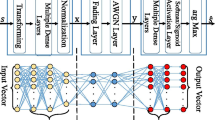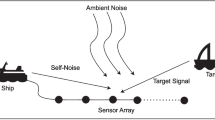Abstract
Driven by the continuous growth of maritime activities such as shipping, resource development, and rescue operations, the demand for highly reliable maritime communication is steadily increasing. This paper proposes a maritime end-to-end autoencoder communication system based on compressed channel feedback (CF-Dense-MAE), building on the existing maritime autoencoder communication system, aimed at enhancing the reliability of data transmission in maritime environments. CF-Dense-MAE integrates feedback encoder and decoder to learn richer signal features through channel feedback and quadratic coding. To reduce feedback overhead, we design an efficient compressed channel feedback mechanism by adjusting the output dimension of the feedback encoder and reconstructing the data in the feedback decoder. CF-Dense-MAE has been trained in environments with Rician fading channels and additive white Gaussian noise, and its model parameters are optimized with a large amount of data. Simulation results show that CF-Dense-MAE outperforms the baseline in terms of block error rate performance, validating its stronger generalization capabilities and communication reliability. With lower feedback overhead, CF-Dense-MAE can provide stable and highly reliable communication services, adapting to complex maritime environments.
The work was supported by the National Natural Science Foundation of China (No. 51939001, No. 62371085) and Fundamental Research Funds for the Central Universities (No. 3132023514).
Access this chapter
Tax calculation will be finalised at checkout
Purchases are for personal use only
Similar content being viewed by others
References
Alqurashi, F.S., Trichili, A., Saeed, N., Ooi, B.S., Alouini, M.S.: Maritime communications: a survey on enabling technologies, opportunities, and challenges. IEEE Internet Things J. 10(4), 3525–3547 (2023)
Wang, J., et al.: Wireless channel models for maritime communications. IEEE Access 6, 68070–68088 (2018)
She, C., et al.: A tutorial on ultra-reliable and low-latency communications in 6G: integrating domain knowledge into deep learning. Proc. IEEE 109(3), 204–246 (2021)
Jagannath, A., Jagannath, J., Melodia, T.: Redefining wireless communication for 6G: signal processing meets deep learning with deep unfolding. IEEE Trans. Artif. Intell. 2(6), 528–536 (2021)
Wang, B., Xu, K., Zheng, S., Zhou, H., Liu, Y.: A deep learning-based intelligent receiver for improving the reliability of the MIMO wireless communication system. IEEE Trans. Reliab. 71(2), 1104–1115 (2022)
Lin, B., Wang, X., Yuan, W., Wu, N.: A novel OFDM autoencoder featuring CNN-based channel estimation for internet of vessels. IEEE Internet Things J. 7(8), 7601–7611 (2020)
Wu, N., Wang, X., Lin, B., Zhang, K.: A CNN-based end-to-end learning framework toward intelligent communication systems. IEEE Access 7, 110197–110204 (2019)
Kurka, D.B., Gündüz, D.: DeepJSCC-f: Deep joint source-channel coding of images with feedback. IEEE J. Sel. Areas Inf. Theory 1(1), 178–193 (2020)
Jang, Y., Kong, G., Jung, M., Choi, S., Kim, I.M.: Deep autoencoder based CSI feedback with feedback errors and feedback delay in FDD massive MIMO systems. IEEE Wireless Commun. Lett. 8(3), 833–836 (2019)
Lin, B., Han, X., Wu, N., Li, J., Wang, H., Shao, S.: A novel CNN-based autoencoder with channel feedback for intelligent maritime communications. In: 2022 IEEE/CIC International Conference on Communications in China (ICCC), pp. 512–517 (2022)
Huang, P., Wang, W., Pi, Y.: Estimation on channel state feedback overhead lower bound with consideration in compression scheme and feedback period. IEEE Trans. Commun. 65(3), 1219–1233 (2017)
Ban, T.W.: Compressed feedback using autoencoder based on deep learning for D2D communication networks. IEEE Wireless Commun. Lett. 12(4), 590–594 (2023)
Shao, S., Lin, B., Wu, N., Han, X.: A DenseNet-based learning framework toward maritime end-to-end autoencoder communication systems. In: 2023 IEEE/CIC International Conference on Communications in China (ICCC), pp. 1–6. IEEE (2023)
Han, X., et al.: Design of a maritime autoencoder communication system based on attention mechanisms and dense block. TsingHua Science and Technology (2023). https://doi.org/10.26599/TST.2023.9010150
Yee Hui, L., Dong, F., Meng, Y.S.: Near sea-surface mobile radiowave propagation at 5 Ghz: measurements and modeling. Radioengineering 23(3), 824–830 (2014)
Romero-Jerez, J.M., Lopez-Martinez, F.J., Paris, J.F., Goldsmith, A.: The fluctuating two-ray fading model for mmWave communications. In: 2016 IEEE Globecom Workshops (GC Wkshps), pp. 1–6. IEEE (2016)
Romero-Jerez, J.M., Lopez-Martinez, F.J., Paris, J.F., Goldsmith, A.J.: The fluctuating two-ray fading model: statistical characterization and performance analysis. IEEE Trans. Wireless Commun. 16(7), 4420–4432 (2017)
Author information
Authors and Affiliations
Corresponding author
Editor information
Editors and Affiliations
Rights and permissions
Copyright information
© 2025 The Author(s), under exclusive license to Springer Nature Switzerland AG
About this paper
Cite this paper
Han, X., Lin, B., Shao, S., Wu, N. (2025). Design of Maritime End-to-End Autoencoder Communication System Based on Compressed Channel Feedback. In: Cai, Z., Takabi, D., Guo, S., Zou, Y. (eds) Wireless Artificial Intelligent Computing Systems and Applications. WASA 2024. Lecture Notes in Computer Science, vol 14997. Springer, Cham. https://doi.org/10.1007/978-3-031-71464-1_9
Download citation
DOI: https://doi.org/10.1007/978-3-031-71464-1_9
Published:
Publisher Name: Springer, Cham
Print ISBN: 978-3-031-71463-4
Online ISBN: 978-3-031-71464-1
eBook Packages: Computer ScienceComputer Science (R0)




